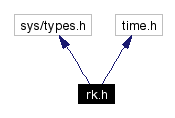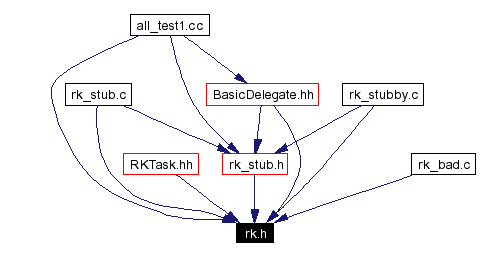
The goal is to provide a close enough approximation that the same code can be used in the simulated and real worlds. The only visible difference between the two is the definition of RK_STUB, so any simulation specific code should be enclosed in an "#if defined(RK_STUB)".
Include dependency graph for rk.h:

This graph shows which files directly or indirectly include this file:

Go to the source code of this file.
Classes | |||||
| struct | cpu_reserve_attr | ||||
| The CPU reservation parameters. More... | |||||
| struct | rk_reserve_param | ||||
| The resource reservation parameters. More... | |||||
Defines | |||||
| #define | RK_STUB 1 | ||||
| Inform the includer that this is the stub version. | |||||
| #define | RK_NAME_LEN 32 | ||||
| Maximum length for resource kernel names in general. | |||||
| #define | RSET_NAME_LEN RK_NAME_LEN | ||||
| Maximum length for resource set names. | |||||
| #define | RT_MIN_PERIOD (struct timespec){0, 20000} | ||||
| Minimum period of periodic process. | |||||
| #define | NULL_RESOURCE_SET ((rk_resource_set_t)0) | ||||
| NULL constant value for a resource set. | |||||
| #define | NULL_RESERVE ((rk_reserve_t)0) | ||||
| NULL constant value for a reserve. | |||||
| #define | clock_gettime(clock_id, ts) rk_clock_gettime(clock_id, ts) | ||||
| |||||
| #define | clock_settime(clock_id, ts) rk_clock_settime(clock_id, ts) | ||||
| This function should really only be used to set the time to a value _before_ the next event.
| |||||
| #define | clock_getres(clock_id, ts) rk_clock_getres(clock_id, ts) | ||||
| |||||
Typedefs | |||||
| typedef rk_reserve_param * | rk_reserve_param_t | ||||
| The resource reservation parameters. | |||||
| typedef cpu_reserve_attr * | cpu_reserve_attr_t | ||||
| The CPU reservation parameters. | |||||
| typedef rk_resource_set * | rk_resource_set_t | ||||
| Opaque reference to a resource set. | |||||
| typedef void * | rk_reserve_t | ||||
| Opaque reference to a resource reserve. | |||||
Enumerations | |||||
| enum | rk_processor_t { RK_ANY_CPU = -1 } | ||||
| Enumeration that can be used to specify which CPU a resource set can be bound to. More... | |||||
| enum | rk_reserve_mode_t { RSV_HARD = 0x1, RSV_FIRM = 0x2, RSV_SOFT = 0x4 } | ||||
| The resource reservation modes. More... | |||||
| enum | clockid_t { CLOCK_REALTIME, CLOCK_VIRTUAL, CLOCK_PROF } | ||||
| A clockid_t enumeration for those OS's that do not support it. | |||||
Functions | |||||
| void | rk_inherit_mode (int dummy) | ||||
| Not implemented. | |||||
| rk_resource_set_t | rk_resource_set_create (const char *name) | ||||
| Construct a mock resource set with the given name. | |||||
| void | rk_resource_set_destroy (rk_resource_set_t rs) | ||||
| Destroy a resource set. | |||||
| int | rk_resource_set_set_name (rk_resource_set_t rs, const char *name) | ||||
| Set the name of a resource set. | |||||
| int | rk_resource_set_get_name (rk_resource_set_t rs, char *name_out) | ||||
| Get the name of a resource set. | |||||
| rk_reserve_t | rk_resource_set_get_cpu_rsv (rk_resource_set_t rs) | ||||
| Get the CPU reserve from the given resource set. | |||||
| int | rk_resource_set_attach_process (rk_resource_set_t rs, pid_t pid) | ||||
| Attach a process to the resource set so that its callbacks will be used when a data period is starting/ending. | |||||
| int | rk_resource_set_detach_process (rk_resource_set_t rs, pid_t pid) | ||||
| Detach a process to the resource set. | |||||
| rk_resource_set_t | rk_proc_get_rset (pid_t pid) | ||||
| Get the resource set attached to the given process. | |||||
| int | rk_cpu_reserve_create (rk_resource_set_t rs, rk_reserve_t *r_out, cpu_reserve_attr_t ra_in) | ||||
| Create a CPU reserve for the given resource set. | |||||
| void | rk_cpu_reserve_delete (rk_resource_set_t rs) | ||||
| Delete a CPU reserve held by a resource set. | |||||
| int | rk_cpu_reserve_get_attr (rk_reserve_t cr, cpu_reserve_attr_t ra_out) | ||||
| Get the reservation parameters for a given CPU reserve. | |||||
| int | rk_cpu_reserve_ctl (rk_resource_set_t rs, cpu_reserve_attr_t ra_in) | ||||
| Change a CPU reserve's scheduling parameters. | |||||
| int | rk_clock_gettime (clockid_t clock_id, struct timespec *ts) | ||||
| Get the simulator's virtual time. | |||||
| int | rk_clock_settime (clockid_t clock_id, struct timespec *ts) | ||||
| Set the simulator's virtual time. | |||||
| int | rk_clock_getres (clockid_t clock_id, struct timespec *ts) | ||||
| Get the simulator's virtual clock resolution. | |||||
|
|
The resource reservation parameters. XXX Currently, all three fields must contain the same RSV value. |
|
|
Enumeration that can be used to specify which CPU a resource set can be bound to.
|
|
|
The resource reservation modes.
|
|
||||||||||||
|
Get the simulator's virtual clock resolution.
|
|
||||||||||||
|
Get the simulator's virtual time.
|
|
||||||||||||
|
Set the simulator's virtual time. This function should really only be used to set the time to a value _before_ the next event.
|
|
||||||||||||||||
|
Create a CPU reserve for the given resource set. In order to simulate this reserve, a "times" file must be available in the current directory. The contents of the file should be a whitespace separated list of floats that specify the percentage of CPU time required by the process for a repeating sequence of periods. For example, the times file for a resource set named "steady_50" that required 50% of the CPU at every period would be named "steady_50_cpu_times" and contain only "50.0". Another, more complex example, would be a reserve that oscillated between 10% and 50% with 10% steps would contain "10.0 20.0 30.0 40.0 50.0 40.0 30.0 20.0 10.0". The output of CPU simulation is a set of files that can be fed into gnuplot. The contents of the file are two columns of numbers, a time value, and a CPU percentage or an arbitrary value that marks some event. The current list of files is:
|
|
||||||||||||
|
Change a CPU reserve's scheduling parameters.
|
|
|
Delete a CPU reserve held by a resource set.
|
|
||||||||||||
|
Get the reservation parameters for a given CPU reserve.
|
|
|
Get the resource set attached to the given process.
|
|
||||||||||||
|
Attach a process to the resource set so that its callbacks will be used when a data period is starting/ending. Note: The simulator only supports one process being attached at a time.
|
|
|
Construct a mock resource set with the given name. The name has special meaning in the simulator, it will be used as the base for any files that are produced or read by the stub code. For example, a file produced or read by the CPU reserve will use file names of the form: _cpu_<file-type>.
|
|
|
Destroy a resource set.
|
|
||||||||||||
|
Detach a process to the resource set.
|
|
|
Get the CPU reserve from the given resource set.
|
|
||||||||||||
|
Get the name of a resource set.
|
|
||||||||||||
|
Set the name of a resource set. This is provided for compatibility and is otherwise unwise to use since the name has meaning in the simulation code.
|
 1.3.4
1.3.4